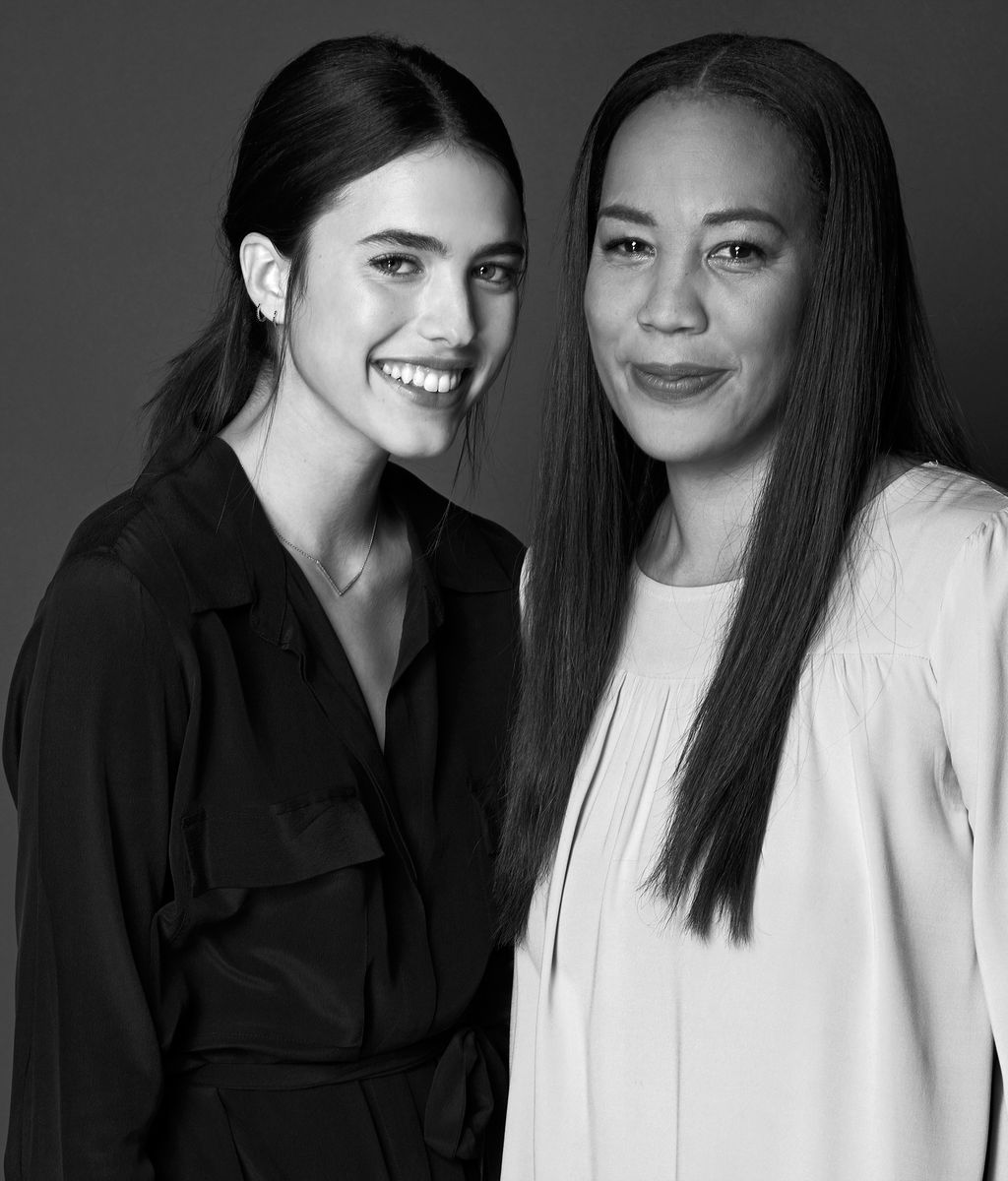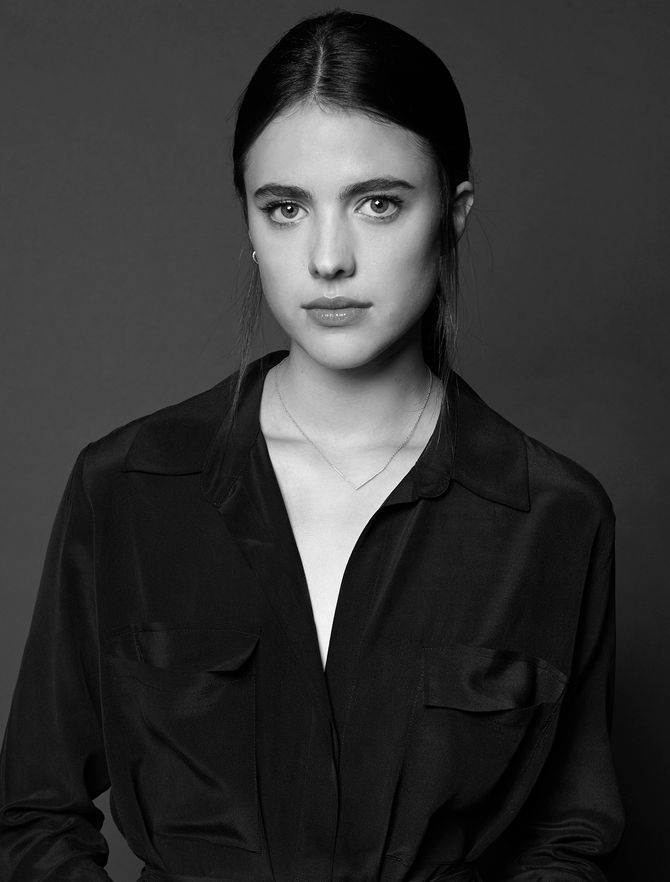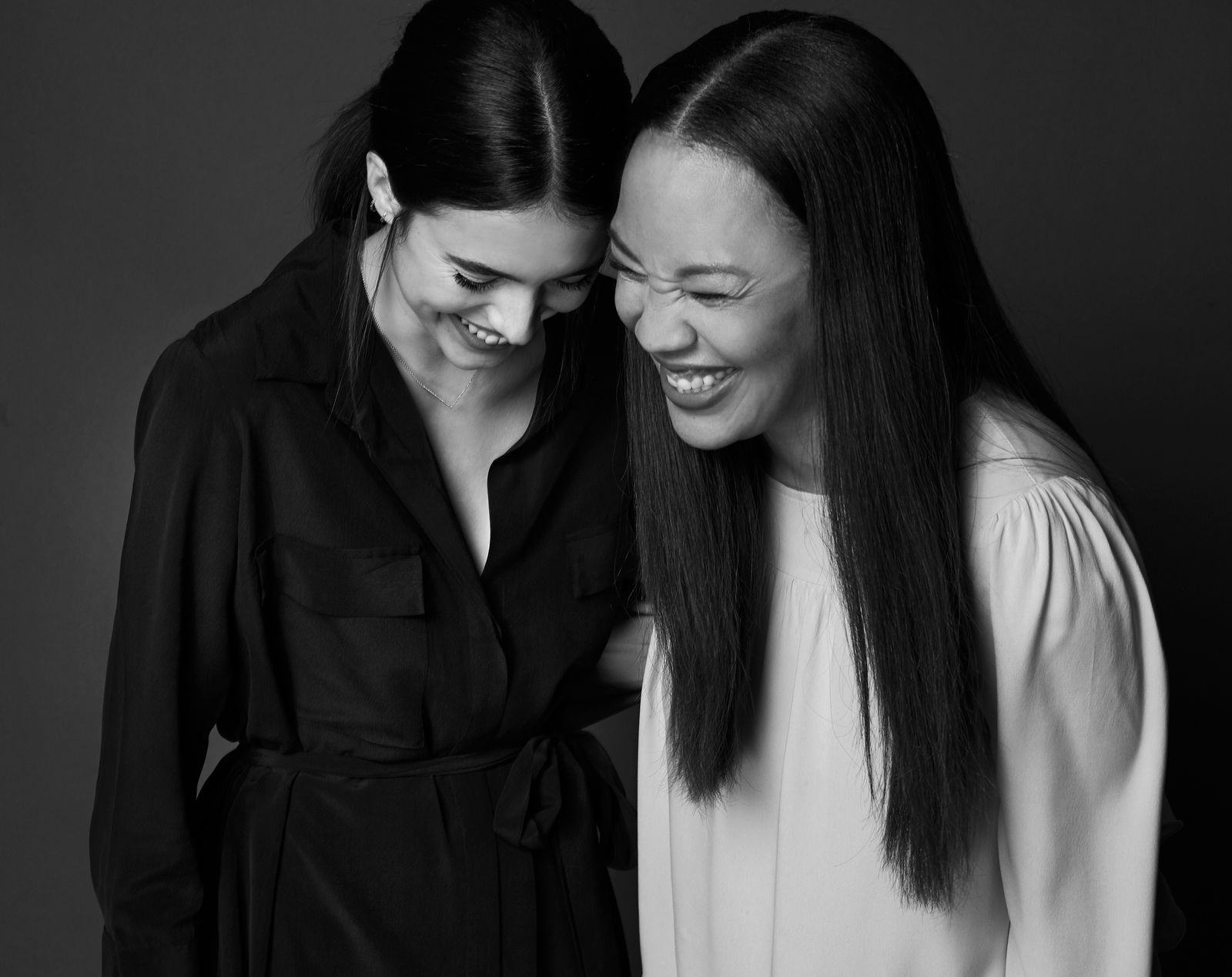Early in Novitiate (out this month), we catch aspiring teenage nun Sister Cathleen (Margaret Qualley) in an intimate moment with her lover. She is kneeling at the foot of her single bed, eyes squeezed shut, her hands clasped together in prayer. “Thank you for letting me be here,” she whispers in a trembling voice. “Thank you for letting me love you like this.” She lets her thumbs graze her quivering bottom lip. “Thank you for letting me feel you so close to me.” Then she lays her head down on the duvet and spreads out her arms to clasp the sides of the bed frame, her hands gripping the fabric, her body practically vibrating with pent-up feeling. “I love you, God,” she murmurs. “I love you, so much.”
Novitiate, the debut narrative feature from filmmaker Maggie Betts, is one of the most surprisingly sensual films of the year. Not because we’ve never seen naughty nuns onscreen before (raunchy convent comedy The Little Hours premiered side-by-side with Novitiate at Sundance this year), but because Novitiate manages to be genuinely erotic while still treating its subjects — and the life they have chosen — with utmost seriousness and respect. This is no nunsploitation flick. Rather, it’s a meticulous, thoughtful exploration of the porous boundary between religious devotion and romantic longing: As Cathleen says in voice-over at the beginning of the film, “Beneath everything else, we were women in love.”
The film follows Cathleen and her fellow nuns (Morgan Saylor, Liana Liberato, and Rebecca Dayan are other novice nuns; Melissa Leo is the stern, terrifying reverend mother) through convent life in 1964, just as the papal reforms known as Vatican II would come to put an end to the institution of the cloistered nunnery as they know it. As they ascend through their training, we get a window into their daily lives: the long periods of wordlessness known as “grand silence,” the restricted gaze known as “custody of the eyes” (intended to filter out excess stimulation and temptation), and the ritual self-flagellation known as “the chapter of faults.” We also see those other parts of convent life that were just as ubiquitous, if not officially named: the craving for human touch, the intimate relationship between each woman and God, the isolation from their families (Julianne Nicholson plays Cathleen’s bereft, agnostic mother), and the “particular friendships” that inevitably sprouted through cracks in the monastic lifestyle. The result is a remarkably thorough portrait of daily life in a nunnery, but one that’s also a universal story about female desire. “I was curious about how much of love is a projection,” explains director Maggie Betts. “It was an interesting way to look at the way women love even when the love object isn’t present, how they create the same, in many ways, dysfunctional patterns: You are not good enough, you don’t deserve his love, you have to do something to get him to love you back, then he loves you back …”
Betts — a society fixture who shares a townhouse with close friend Barbara Bush, and scion of mega-millionaire Roland Betts (a longtime film financier, Chelsea Piers owner, and George W. Bush’s BFF) — is, on paper, pretty much the last person you’d expect to make a film about the repressive asceticism of ’60s nunneries. “It’s so funny, the snickers that come from anybody who’s known me for even a hot second when someone asks, were you a nun?” she laughs. “Like, uh, no, I was not a nun.” Drinking a glass of red wine in a leather armchair in the lobby of the Bowery Hotel, Betts seems like she could command almost any room, whether lecturing from a podium or schmoozing at an after-party. Today, lounging in a chic floor-length floral dress (designer Prabal Gurung, by the way, is also a close friend), she radiates confidence and comfort, punctuating our conversation with wry asides and a deep, throaty laugh.
Betts first came to the subject of nuns when she picked up a book of Mother Theresa’s letters at the airport. She was on her way to Zambia (a trip encouraged by the elder Barbara Bush), where she would eventually make her first documentary, The Carrier, about a pregnant woman with HIV. Reading the book on the plane, she was bowled over. “These letters were like, obsessively concerned with her love relationship with her husband, and it was so wild — like the craziest love affair,” recalls Betts. “Like, one day she had never felt more filled by his love and the passion and everything, and then the next day it was like he’d left and if you read between the lines, she was almost suicidal.” Only halfway through the book did Betts realize it was describing a relationship with God. “So then I was like, Am I the only person that knows that Mother Theresa is crazy? I’m literally the only one in the world. I’ve just broken one of the biggest stories of all time,” she laughs. Betts started reading more autobiographies by nuns, many of them describing the upheaval of the modernizing reforms of Vatican II, which pushed nuns to abandon their habits and become more actively engaged in community life outside the convent, ultimately causing an exodus of 90,000 nuns. “I kind of follow what I get obsessed with,” Betts says.
Much of Novitiate turned on finding the right actress to play the young nun, who arrived in the swanlike form of Margaret Qualley (daughter of Andie MacDowell and her ex-husband, Paul Qualley). A few minutes after Betts and I have begun our interview, the 22-year-old actress glides in, dressed in an ankle-length black skirt, an oversize black sweater, and black ballet flats. In person, Qualley’s Disney Princess features are offset by an appealing goofiness: She still carries a little bit of residual teenage awkwardness in her otherwise graceful dancer’s body, with a nasal giggle and a tendency to scrunch her eyes shut and bite her lip when she’s thinking hard. She immediately flops over the armrest of Betts’s chair and puts her head in her lap. “I’m so tired,” she moans.
“Margaret’s been living in a convent, that’s why she’s dressed like this,” says Betts as she envelops her in a full-body hug.
“You guys, this is just how I dress,” Qualley protests. “Maggie always makes fun of me for dressing like a nun in real life.”
Betts had seen about 40 girls for the part, looking for someone who was up-and-coming but not quite established. Qualley — who was then starring as Justin Theroux’s broody teenage daughter on The Leftovers — came across her desk. “I had a Skype set up with her and I watched like half of her Leftovers reel and I was like, Oh, she’s really good. She’s kind of like an angsty teen. And then I was like, I’m gonna cancel this, I’m just not in the mood.”
“Thanks, Mags. Thanks, Mags,” Qualley says.
“And then I was like, Let me just do this one,” Betts says. “And it was so weird – literally within, like, five perfunctory minutes of hey, yeah, blah, blah, blah, I was like, she’s everything. It’s like when reality steps in to exceed the bounds of your imagination. It was everything that I had imagined. It was one of the more euphoric moments of my creative life.”
“Feel free to send me the recording of this interview,” Qualley deadpans.
While Qualley has already established her ease with a range of material (from grappling with the fallout of the rapture in The Leftovers to dancing like a maniacal Gumby in Spike Jonze’s Kenzo ad), Novitiate has the potential to be her breakout role. Her unique mixture of awkwardness and elegance proved perfect for the part of the shy, intense, hopelessly devout Sister Cathleen, who has to communicate — often in very few words — the earth-shattering, head-over-heels infatuation she feels toward God.
For Qualley, the regimented structure of convent life evoked her own experience studying ballet. “I think Cathleen has a longing for discipline and structure, and the life of a nun provides a clear path in which she can be a better person. The ballet world is similar; there are certain things that you can do to get better and become this kind of perfect thing. Which is ultimately, I think, why I quit ballet. I used to love dancing so much, and then at a certain point, it wasn’t about loving it, it was just about being perfect,” she says.
As Cathleen struggles more and more with her isolation and loneliness, she begins to rapidly drop weight. (“I thought if I starved myself on the outside, I wouldn’t feel myself starving on the inside,” she explains.) It’s something Qualley can relate to as well. After she quit dance at age 16, Qualley moved to New York on her own and took up modeling, leading to one of the hardest years of her life. Outside of the structure of the dance world, Qualley found herself imposing her own forms of self-discipline, rapidly losing weight and shutting herself off from other people. “I was 20 pounds less than I am now and starving myself. I lived alone, I didn’t know anybody in New York, and I was definitely a recluse. It had been, like, two weeks, and I realized I hadn’t said anything. I was laying in bed and I was like, ‘Hello?’ I just talked to hear my own voice. And it was such a strange feeling. I think the film brought me back to that time.”
Filming was a profound experience for Betts, too. She spent her 20s “sort of unmoored. Drifting in these kind of circles. I wanted to make a movie so badly, but I did not have the self-confidence or the focus and discipline,” she says. “Since I started making movies — this kind of makes me sad — I feel so myself.” She begins to tear up. “And I never felt like that in my 20s. I never felt centered or anything. I was privileged and all that kind of stuff, but I was just wandering like any unhappy kid.”
One advantage of being independently wealthy (the film was funded privately by Betts’ friends and family) is added latitude to make the film you want, even if it’s not the kind of film a studio would be inclined to fund – for instance, a highly-researched period drama about nuns, with a bunch of interesting, complicated female roles (and almost no men at all).
It also allowed Betts to create her own little filmmaking utopia, with a female director of photography and an intimate, safe, almost familial on-set environment, where everyone was free to express ideas and try new things. Recently, much lip service has been paid to the notion of “the female gaze” in filmmaking: an amorphous, hard-to-define concept, but one that’s immediately palpable in The Novitiate. Throughout the film, cinematographer Kat Westergaard’s camera takes us into the nuns’ bedrooms, where we see them wake up tousle-haired in the morning, shots that are almost postcoital in their rumpled intimacy. We see the girls dressing and undressing, often covering themselves even while alone, shy to be naked in God’s view. We see them alone with their self-loathing, crying and berating themselves, both verbally and physically. We see them touch themselves, overcome by the force of their suppressed longings. With any number of male directors at the helm, it’s easy to imagine this all veering into nuns-gone-wild territory. But Betts’ and Westergaard’s work feels intimate and never voyeuristic, offering a visual language to communicate what it’s like to be a young woman coming to terms with newfound emotional and physical urges.
Memories from the shoot, which took place at a women’s Methodist college at Vanderbilt, have the nostalgic quality of summer-camp reminiscences. One night, Qualley recalls they spent the night at the convent, where they observed grand silence (no cell phones allowed) and had Melissa Leo, who lived in a church during the shoot, wake them up with a bell at 5 a.m. “They were like a little wolf pack! There’s a scene where [Qualley] and Liana Liberato are talking about if they’ve ever had sex, and those two would not stop giggling,” laughs Betts. “That was such a nightmare. Kat, my DP, was like, ‘How much soda did they have?’ I was like, Who says that about women in their 20s? You say that about a 6-year-old.”
“We joked around about that scene in Boogie Nights where it’s like, ‘Will you be my mom?!’” laughs Qualley. “It’s very maternal,” adds Betts.
Having got nuns out of her system, this idea of female-only spaces are something Betts — who counts Sofia Coppola as one of her filmmaking heroes — wants to continue exploring. (She’d also like to tell a story that deals with women of color, given her own mixed-race background, although she says it would have been weird to have black characters in this milieu). “All my upcoming projects deal with almost, like, David and Goliath stories of female empowerment,” she explains. “Weirdly, all of them deal with these individual female characters who are are going up against enormous powers.” Betts adds, unprompted, that the Weinstein reckoning was an “amazing” thing.
“I think women were like, ‘Oh we have had enough,’” she says. “It feels like this shift. It feels like society is finally wrapping its head around viewing women in a different, far more substantive, don’t-fuck-with-them way. I think it’s a great time to make movies about the female experience.”
While she won’t reveal what her next film is about, she does tell me that Qualley came up with the idea for it. As to whether they would work together again? “Absolutely, like, 150,000 percent,” says Betts.
Qualley gazes at her lovingly. “I wanna do every movie with Maggie.”
Production Credits:
Photos by Derek Kettela
Produced by Biel Parklee
Hair by Alexander Armand using Oribe Haircare for Exclusive Artists
Makeup by Tasha Brown using Bobbi Brown for Exclusive Artists


